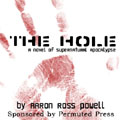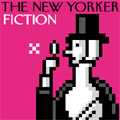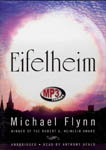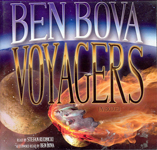
 Aaron Ross Powell is blogging and podcasting his post-apocalyptic novel. Aaron sez:
Aaron Ross Powell is blogging and podcasting his post-apocalyptic novel. Aaron sez:
“The book grew out of an idea I had while reading Under the Banner of Heaven, a book about Mormon history. So I suppose it’s, in a sense, a Mormon apocalypse story. I originally intended it as a long-ish short story, but it grew on me until I figured it’d work best as a novel. Doing it in blog posts was mostly meant as a motivational tool. I’d written half of another novel some time ago, but I had a difficult time making myself actually sit down and write. Writing online, in the open, meant that I’d have an audience waiting for each new piece, making me kind of obligated to produce. And that’s worked terrifically. The response has been far larger and enthusiastic than I could’ve ever expected, so I imagine I’ll keep with this method after The Hole‘s finished and I start on my next novel.”
After hearing that I asked Aaron about the connection between his other website Symbolic Order (a non-fiction site) and The Hole. Here’s what he said:
“I’d never thought much about the connection between the two, though I suppose it’s there. Symbolic Order was launched in 2000, I believe, with my good friend, Trevor Burrus — who’s now a fellow student of mine at the University of Denver’s law school. It was mainly meant to serve as an outlet for our non-fiction writings and essays, and so the topics addressed have drifted over time as our interests change. Recently, this has meant a lot of religious articles, since both Trevor and I are fascinated by the topic. This interest lead me to grab Krakauer’s book [Under The Banner Of Heaven] when I saw it on the CD rack at the library. I listened to it and was hooked on Mormonism, primarily because of the opportunity that particular faith yields to study a major religion’s formation at a time when the events were substantially documented — as clearly isn’t the case with standard Christianity, Judaism, or Islam. I kind of just had a “what if…” idea while reading one of the accounts of Joseph Smith’s finding/forging of the Book of Mormon and decided to run with it. That’s actually the part of the novel I’m most concerned about: I think the idea is pretty neat and I’m excited to get those plot points exposed, but I’m going to have to work hard to make it believable. I’m optimistic, but we’ll have to see. — At the broader level, from a non-believer’s perspective, religion is science fiction and it is fantasy. A god leads his chosen people on bloody battles throughout the realm. A merchant discovers pseudo-magical powers and becomes a great monarch. The secret history of America is exposed in ancient and hidden texts. The only difference is that, with religion, people believe it. That’s why I think of someone like Smith as a fantasist in the same vein as, say, Lovecraft. They’re imagining mythos and exploring their implications. Except that Smith ended up with millions of followers who think his vision will lead them to immortal bliss. It’s an odd relation, literary fantasy and religion, and one I haven’t thought much about. Now that you’ve drawn it to my attention, I’ll have to do so. Maybe my next piece of Symbolic Order…”
Right now, only the first five parts, of the existing fifty-two blogged ones, have been podcast. They are extremely short, but powerful, and remind me of the opening chapter of Richard Matheson’s I Am Legend.
Subscribe to the podcast via this feed:
http://feeds.feedburner.com/TheHoleAudiobook
Posted by Jesse Willis






